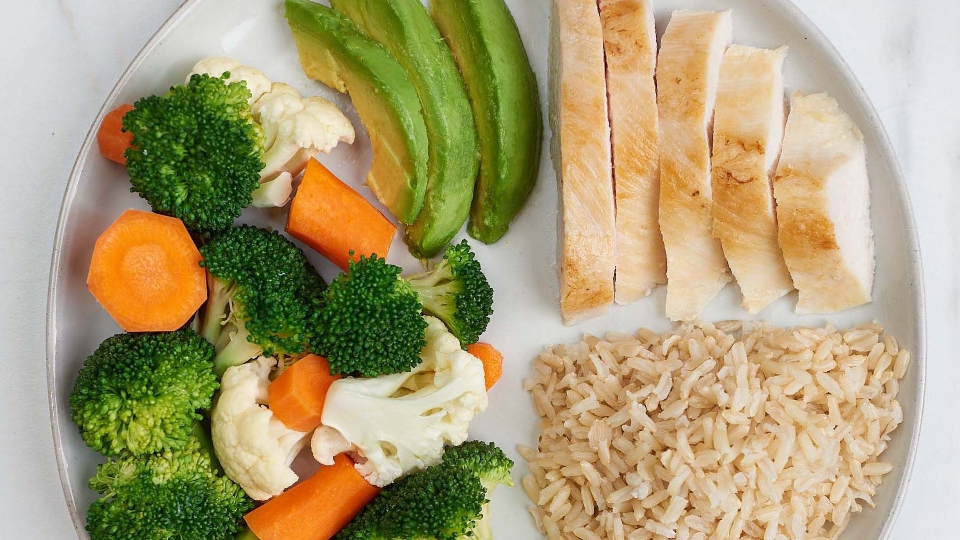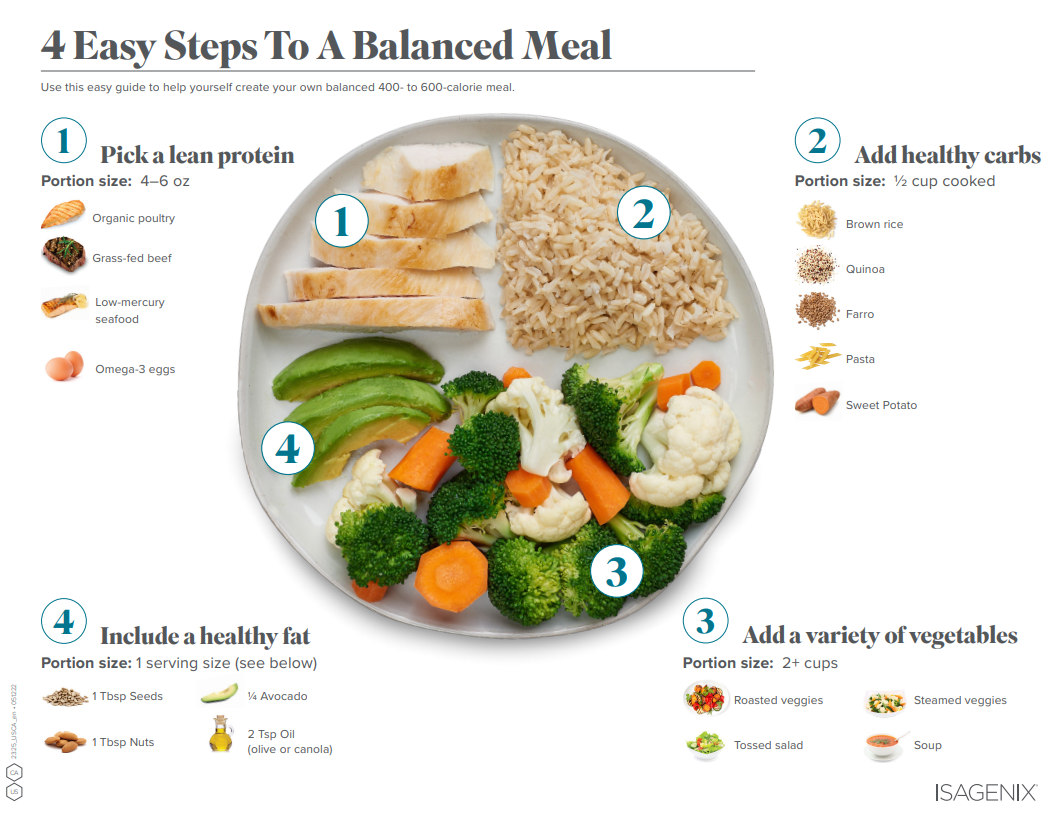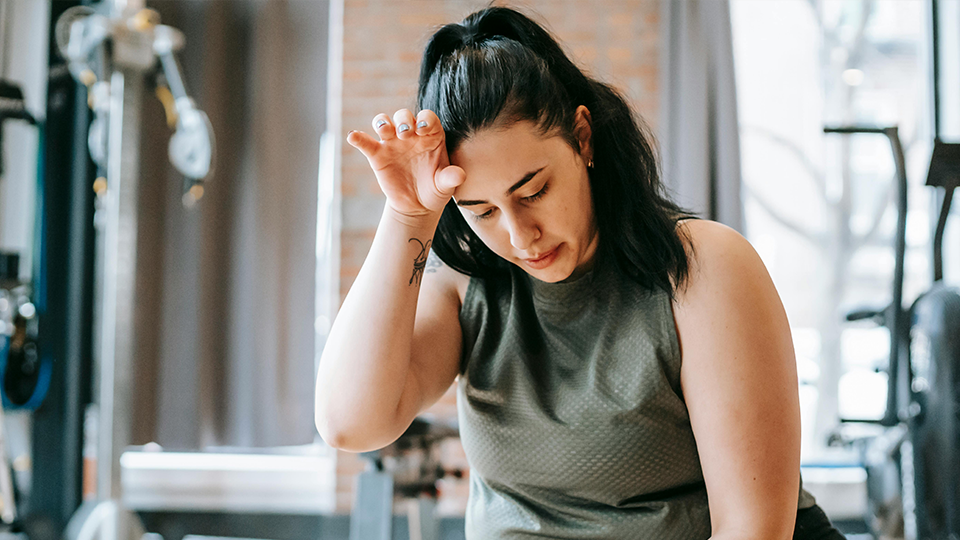On Shake Days, you replace two meals with an IsaLean® Shake and enjoy a nutritionally balanced third meal. How you fill your plate for your third meal is an important part of reaching your wellbeing goals.
4 Easy Steps to Building a Balanced Meal
A healthful, balanced meal includes a variety of foods that provide your body with essential nutrients in the right proportions. Choosing foods you enjoy is just as important as planning portion sizes that provide the right amount of calories for you. For most people with a weight loss or weight maintenance goal, 400-600 calories are right on target. Some people may need more calories, depending on personal factors, like how active you are, or your individual wellbeing goals.
Take the hassle out of meal planning and fill your plate with these easy steps to building a balanced third meal.
Pick a Lean Protein
When building a balanced meal, you’ll want to start with the base of your meal – the lean protein. Providing your body with a quality source of protein at each meal will help you feel satisfied longer while supporting muscle growth and metabolism (1-3).
Pick four-six ounces of your preferred lean protein like fish, chicken, eggs, or beef. This should fill about a quarter of your plate.
Add Healthy Carbs
Next, your body needs complex carbohydrates to provide a steady source of energy. The best options are also high in dietary fiber to help you feel full.
Aim for a ½ cup portion or about a quarter of your plate. Whole grains such as quinoa or brown rice or starchy vegetables like sweet potatoes are great options.
Add a Variety of Veggies and Fruit
Fruits and vegetables make up the biggest part of a nourishing meal and are sources of many essential nutrients, such as vitamins, minerals, and fiber. Additionally, extensive research shows that people who eat more fruits and vegetables live longer and healthier lives (4). Filling your plate with vegetables not only has impressive nutritional benefits but also helps to make a meal more satisfying.
Add about two cups of vegetables – roasted, steamed, salad, or soup – the options are endless and should fill almost half your plate.
Include a Good Fat
Finally, good fats are an important part of any meal. Mono- and polyunsaturated fats are the good fats that are found in plant-based foods like olive oil, nuts, seeds, and avocado. They contribute to overall health and wellbeing and are a source of essential fatty acids. Adding a little fat to your meal can keep you feeling satisfied and can aid in the absorption of certain vitamins, including A, D, E, and K.
Top your meal off with a little good fat such as ¼ avocado or a dressing made with two teaspoons of olive oil and balsamic vinegar drizzled on your veggies. A tablespoon of chopped nuts or seeds adds a delicious crunch to salads.
Reimagine Your Favorite Meals
Creating a balanced third meal doesn’t mean you need to do without your favorite foods. By following the four steps to a balanced meal, it’s simple to reimagine your favorite meals with a more healthful twist or explore more delicious 400-600 calorie recipe ideas here.
Deconstructed Burger and Sweet Potato Fries
Skip the typical burger and fries and build a more balanced burger bowl:
Lean Protein: 4 ounces of lean cooked ground turkey or beef
Complex Carbs: ½ cup of oven-roasted sweet potato fries
Veggies: 2 cups of leafy greens, plus extras like tomatoes and onion
Top with your favorite burger toppings: pickles, a little cheese or avocado, and a drizzle of your favorite sauce.
Nutrition Profile: less than 500 calories, about 24 grams of protein and 23 grams of carbohydrates.
Coconut Thai Chicken and Rice
No need for take-out with this nutritious Thai-inspired chicken recipe that’s bursting with flavor:
Lean Protein: 4 ounces shredded chicken per serving
Complex Carbs: ½ cup of brown rice per serving
Veggies: Frozen spinach, peas, and onion
Nutrition Profile: around 400 calories per serving, 38 grams of protein, and 26 grams of carbohydrates.
What makes a meal balanced is its essential components; lean proteins, good fats, fiber, complex carbohydrates, vitamins, and minerals. For most people, building a meal with four-six ounces of protein, ½ cup of complex carbohydrates, and about two cups of vegetables, is right on target. Following these four easy steps makes creating a balanced meal simple.
References
- Mamerow MM, Mettler JA, English KL, etval. Dietary protein distribution positively influences 24-h muscle protein synthesis in healthy adults. J Nutr. 2014 Jun;144(6):876-80.
- Crovetti R, Porrini M, Santangelo A, et al. The influence of thermic effect of food on satiety. Eur J Clin Nutr. 1998 Jul; 52(7):482-8.
- Leidy HJ, Mattes RD, Campbell WW. Effects of acute and chronic protein intake on metabolism, appetite, and ghrelin during weight loss. Obesity. 2007 May;15(5):1215-25.
- Wallace TC, Bailey RL, Blumberg JB, et al. Fruits, vegetables, and health: A comprehensive narrative, umbrella review of the science and recommendations for enhanced public policy to improve intake. Crit Rev Food Sci Nutr. 2020;60(13):2174-2211.






